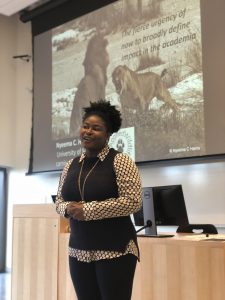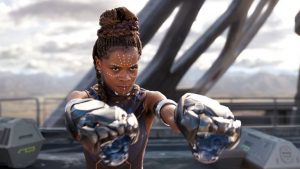By BRiDGE Committee Member Nigel Golden
In the movie Black Panther, the brilliant Scientist Shuri states that: “Just because something works doesn’t mean it can’t be improved.” This is essentially what Dr. Nyeema Harris makes the case for when it comes to redefining “impact” in academia. At the BRiDGE2Impacts talk, “The fierce urgency of now to broadly define impact in academia”, Dr. Harris gave the audience tools to reevaluate and amend the metrics used to measure the impact of scientific research on society and the natural environment.

Dr. Nyeema Harris from University of Michigan presenting “The fierce urgency of now to broadly define impact in the academia”
It is increasingly expected, particularly by funding agencies, that scientists plan for and demonstrate the impact of their work. There are already several established metrics to measure academic impact. The most simplistic is citation count – or the total number of citations. Dr. Harris expands the definition of “impact” to include broadening participation in science, exposure, and engaging a broader audience in the scientific process. As an undergraduate student, Dr. Harris studied how to determine the age of orphaned black bear cubs for natural resource agencies and learned the value of doing science for broader audiences. Now that she is an assistant professor, Dr. Harris’s lab of Applied Wildlife Ecology (AWE) at the University of Michigan works to provide immersive experiences through public science, both for undergraduates and others. So how does Dr. Harris engage the public through her science?
Dr. Harris studies how different species occupying the same geographic area and in a particular time interact with each other – through the lens of the carnivores and their prey in the State of Michigan. Dr. Harris crowdsources public help through Michigan ZoomIN to identify the animals of Michigan in pictures, taken from an expansive array of camera traps – a standard tool in ecological research and wildlife conservation. Dr. Harris and her team use this remote camera survey data to understand how carnivores and other species respond to changing landscapes. This simple tool allows the public to help with data collection, and to learn about predator/prey interactions, foodwebs, biodiversity, and human impact – core topics in the life sciences.
Ultimately, Dr. Harris states that her goal is to create a legacy – and the best way to achieve this is though mentoring, stimulating curiosity of the natural environment, and instilling awe (did you catch that?) in the public. To Dr. Harris, her mentorship doesn’t need to result in a trajectory into science – it’s the exposure that matters. She states: “Whether someone becomes an -ologist or not doesn’t really matter, they are still leaving a footprint on the natural system – and need to help promote and stimulate awe and appreciation for that system – and one way to do that is through exposure.” To everyone reading this blog post, we call that the “Shuri effect.” Dr. Harris encourages us all to redefine “impact” by contemplating where we work, what we work on, and how we produce knowledge in the context of our science.

Shuri from Black Panther. Source: https://goo.gl/X3NGCY
For myself, if you haven’t already, I encourage you to watch Black Panther.
Instagram: @awecarnivores


